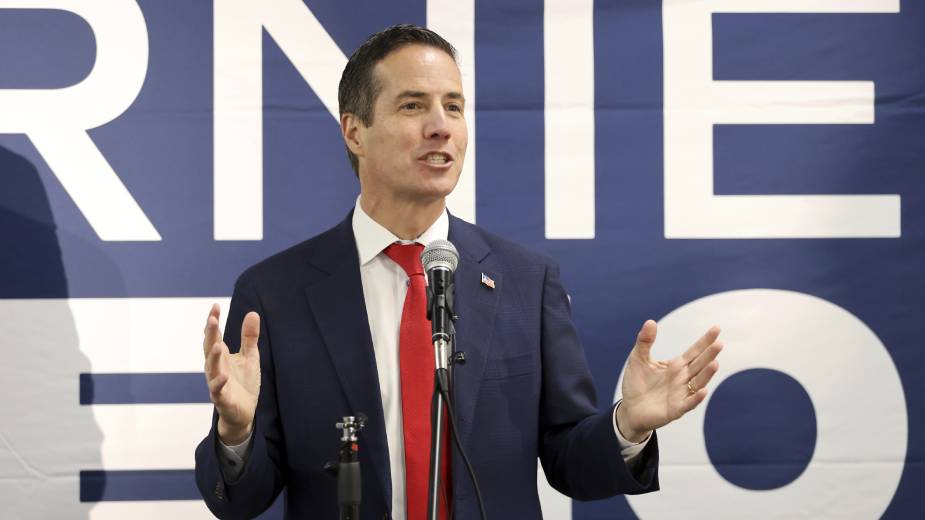Trump Fiscal 2020 Budget ‘Dead on Arrival’ – Ryan
WASHINGTON – President Donald Trump’s 2020 budget drew criticism from Democrats and Republicans representing Ohio in Congress.
U.S. Rep. Tim Ryan and U.S. Sen. Sherrod Brown issued statements Monday afternoon broadly criticizing the plan, while U.S. Sen. Rob Portman took specific aim at the president’s proposal to cut funding for the Great Lakes Restoration Initiative by 90%.
Overall, the $4.7 trillion proposal calls for $2.7 trillion in spending cuts, with nondefense spending reduced by 5% from 2019 levels with a goal of balancing the budget by 2034. It increases military spending by 5% to $750 billion and provides $8.6 billion for the proposed wall along the U.S. southern border with Mexico.
The budget “embodies fiscal responsibility, and takes aim at Washington’s waste, fraud and abuse,” Russ Vought, acting director of the White House Office of Management and Budget, said in a statement issued by the White House.
Ryan, D-13 Ohio, called the president’s proposal a “nonstarter” in a statement issued by his office. At a time when the country should fund programs that work for the American people, Trump “continues to push for a vanity project that most Americans don’t want and experts say we don’t need,” he said.
The record $4.75 trillion budget also runs up the deficit by another $2 trillion to the $22 trillion national debt – “thanks to unpaid-for tax cuts for the wealthy,” Ryan said. It attacks the Affordable Care Act, Medicare and Medicaid, makes extreme cuts to agriculture, education, workforce development, environmental protections, and health and human services, and targets transportation grant programs such as the one that awarded $10.8 million for infrastructure improvements in Youngstown last year.
“Further, I am extremely disappointed that President Trump’s budget says nothing about the establishment of the East Coast missile defense site where Camp Garfield in Ravenna remains one of the three final sites being evaluated for the project. This makes us less secure and less prepared to deal with threats around the globe,” he said. “This budget proposal is dead on arrival.”
A spokesman for U.S. Rep. Bill Johnson, R-6 Ohio, said he would respond to the proposal following a budget hearing today.
Portman, R-Ohio, said he would again fight to preserve the Great Lakes Restoration Initiative and its funding. The co-chairman of the Senate Great Lakes Task Force called the program a “successful public-private partnership” that helps protect both the environment and the economy
“For the past few years, no matter whether it was a Republican or Democratic-led administration, there have been attempts to cut or eliminate funding for the Great Lakes Restoration Initiative. And every year, we have successfully defeated those efforts and ensured that this critical program receives full funding,” he said.
In addition to criticizing the cut for Great Lakes funding, Brown, D-Ohio, blasted the budget proposal for provisions making the 2017 tax breaks for higher-income Americans permanent, while cutting critical safety-net programs, repealing the Affordable Care Act and replacing it with an alternative that, when proposed in 2017, would cause an estimated 32 million people to lose their benefits.
Brown also criticized proposed $1.4 trillion in cuts for workforce training programs and employment services, reduced benefits to the Supplemental Nutrition Assistance Program by $219 billion over a decade, and elimination of subsidized student loans and Public Service Loan Forgiveness.
“Instead of investing in Ohio communities so they can grow and create jobs, President Trump is asking Ohioans to pay for permanent tax cuts for millionaires by slashing the programs that hardworking families rely on,” Brown said. “I have always fought to ensure we are making critical investments in our communities and I will continue fighting for Ohio priorities throughout this budget process.”
The Ohio Democratic Party echoed Portman and Brown’s critique of the proposed cuts to the Great lakes initiative, which would reduce it to $30 million from $300 million, and would eliminate the National Oceanic and Atmospheric Administration’s Sea Grant program, which monitors and protects the health of Lake Erie — a source of drinking water for 11 million people, according to a release from the party.
“With this budget proposal, Donald Trump is showing us what his priorities are — and his main priority is protecting his massive tax giveaway for the wealthy and corporations like General Motors, which is laying off 14,000 workers despite getting a huge windfall from the GOP tax scam,” said Ohio Democratic Party Chairman David Pepper.
Other cuts noted by Democrats include nearly $850 million over the next decade from the Trade Adjustment Assistance program, which provides support and retraining for workers displaced by trade or outsourcing; and $3.6 billion from the U.S. Department of Agriculture, which would hurt farmers by cutting crop insurance premium subsidies and tightening commodity payment limits. The budget also proposes 30% in cuts to food assistance, instituting mandatory work requirements and “a new bureaucratic nightmare” called the ‘Harvest Box,’ which would send food directly to households instead of paying grocery stores. The proposed budget eliminates the Affordable Care Act’s Medicaid expansion, which provides health coverage to more than 600,000 Ohioans, the organization said.
Cutting the Medicaid expansion would also harm the state’s economy, argues Wendy Patton, senior project director of Policy Matters Ohio. The nonprofit think tank reported the expansion adds $5 billion in federal dollars annually into Ohio’s economy, adding 54,000 full- and part-time jobs.
“The president’s proposed cuts in health care will, if enacted, have a direct, harmful effect on employment across Ohio,” Patton said. “Like his past proposals, President Trump’s 2020 budget plan would harm countless Ohioans and lead to deepening poverty, shrinking opportunity and growing racial inequality. If enacted, the Trump budget will slash $1.9 trillion from programs that help struggling families meet basic needs, harming families of low- and middle-incomes across the nation.”
The budget would also harm Ohio public schools by cutting the Department of Education by 12% while supporting a “school choice” program, “a particularity troubling threat in Ohio where $800 million in state dollars already go to charter schools and voucher programs at the expense of traditional public schools,” Patton said.
“Schools in communities that disproportionately serve students of color are most likely to be harmed by school choice programs, further disadvantaging Black and brown Ohioans,” she said.
Pictured at top: The fiscal 2020 budget submitted to Congress by the White House.
Copyright 2024 The Business Journal, Youngstown, Ohio.



